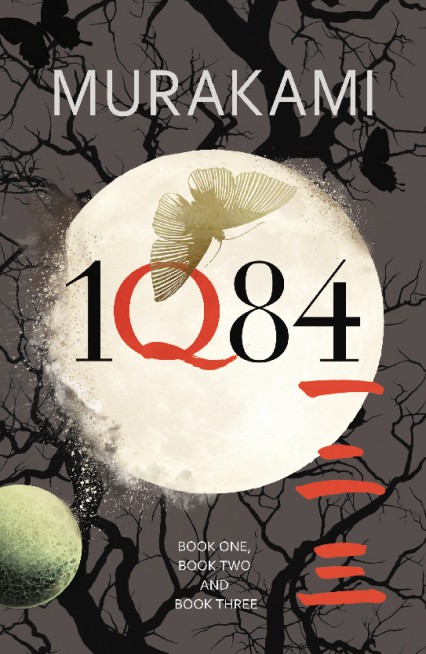Jemma Beggs delves into the latest dystopian world from Haruki Murakami in his novel 1Q84.
‘Two story lines at work, with different starting points but running parallel to each other’. Such is the basis of Haruki Murakami’s 1Q84. Entering the fantastical world of 1Q84 we follow what initially appear to be two very abstract storylines based on the two principal characters; cool clear-headed assassin Aomame and laid-back mathematics teacher and author Tengo.
As each chapter concludes we are plucked from the midst of one story and placed very firmly down into another causing the reader a slight readjustment to orientate themselves, mirroring the characters’ own experiences; as they must acclimatise to 1Q84 we are forced to adapt to the new, distinctive world of the character we are following. Each experience is accompanied by a sense of impatient disappointment directed at Murakami for forcing us to wait to discover the answer to the intriguing question he has left the chapter hanging on. However this feeling is fleeting as our attention is effortlessly recaptured within the first paragraph of the new chapter and we are again totally immersed in events. As the double narrative progresses the jolting sensation is eradicated when the two stories begin to merge as a connection between the two characters is revealed. Although starting from two different points, Aomame and Tengo have been travelling towards the same destination: each other.

by Haruki Murakami
Books 1 & 2: 623pp £20.00
Book 3: 364pp £14.99
Published by Harvill Secker
Some readers may be put off by the high number of seemingly unnecessary and overly graphic sexual descriptions within 1Q84, perversely emphasised by the detached tone in which they are presented. Here, readers who are familiar with George Orwell’s Nineteen Eighty-Four will see an obvious comparison between Murakami’s novel and the author of its namesake (the Japanese for ‘9’ sounds like the English pronunciation of ‘Q’). Orwell’s technique of portraying terrifying imagery and disturbing events in a calm voice which is in direct contrast to the horror of what is being described is adopted by Murakami. Tengo partakes in incestuous role-play, Aomame meets a man heavily involved in child molestation and an alarming episode of male rape takes place. The emotionless blasé tone used to describe these events causes you to frequently catch yourself reading through them with no real shock, only managing to truly process and relate to what you’ve read once you have put Murakami’s novel down and emerged from the confusing world of 1Q84.
But the real struggle is trying to disengage with the book. There are just too many questions left unanswered. Barely anything has been explained and you are left wondering what has happened to this character? What was the relevance of this? Why did this happen? Who was that? To some readers this would undoubtedly be a frustrating, anti-climactic ending to a 987 page story. But the quintessential point of 1Q84 is that it is just like real life with only a few minute changes, unnoticeable to the vast majority. As 1Q84 is not just a figment of the author’s imagination; it is an alternate reality. Perhaps, as in real life, there are questions left unanswered because there are some things which simply have to be left to ‘the great unknown’. For the realists among us there is the slightly less romantic notion that Murakami was merely leaving himself the option for a fourth instalment rather than making a profound link between the real and literary world; another open question. Add it to the list.
And finally, the most important question; what exactly is Murakami trying to say? 1Q84 explores a great many of those themes which continue to fascinate the human race. The ethical question of whether murder can ever be justified nestles comfortably between loneliness and escapism. Free will and fate rub along with finding one’s purpose in life. Religion, love and death are all explored within this three part story so it is no wonder it is such a lengthy, intricate piece of work. If anything those who found themselves struggling through the novel should be grateful it was confined to 900 and not 9000 pages. And why exactly did Murakami separate it into three books? The first two parts were released simultaneously which is just as well as the first part finishes so abruptly most reader would find themselves back at the bookshop demanding a new copy complete with the final pages. There seems no obvious explanation for the year-long delay of the release of the third book so again it is left to the reader to interpret as they will.
1Q84 is one of those pieces of work which is all about the journey. The ending is almost impossible to predict but once you’ve read it you realise there was really nothing else that could have happened. To a certain extent the ending is irrelevant, only there because it is ‘the done thing’. 1Q84 is all about the world Murakami creates. It is about the possibility that any of us could slip into an alternate universe and bring to life that world. It is about the trials people go through, the tragedies life contains and how at a closer glance the mundane can become the extraordinary. But underneath all the intense description and surrealism, at heart it is a book about the enduring, magical strength of true love. And despite the utter absurdity of 1Q84 the day you finish it you may find yourself staring at the night sky just to gaze at the moon.










